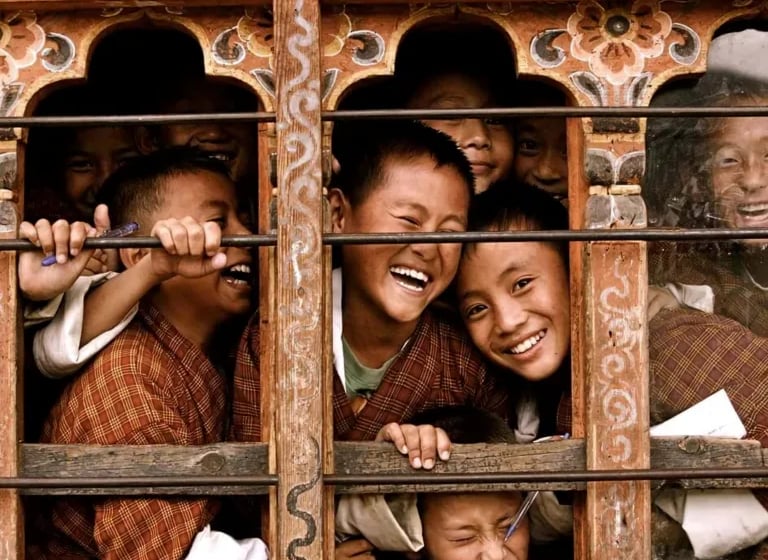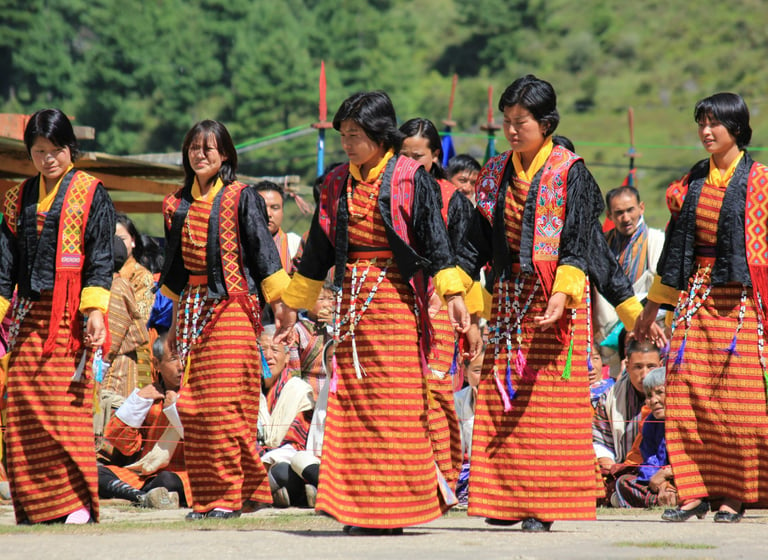People, Language & Culture
Bhutanese culture is a rich blend of spiritual devotion, unique architecture, vibrant festivals, and a lifestyle deeply rooted in tradition. Central to this is its Buddhist heritage, which shapes the country's values, social practices, and distinctive architecture. Traditional buildings like homes, temples, and dzongs are constructed using natural materials such as wood, mud, and stone, often without nails. These structures are adorned with intricate designs that reflect Bhutan’s reverence for both nature and spirituality.
Tshechus, Bhutan’s lively festivals, bring communities together to celebrate through music, dance, and religious rituals. Held annually in various districts, these festivals honour local deities and feature sacred mask dances. Tshechus are not only spiritual gatherings but also vibrant social events where families and friends unite in their finest traditional attire.
Bhutanese life is closely tied to nature and spirituality, with many people living in rural communities where farming is a major occupation. The nation’s development philosophy, Gross National Happiness (GNH), emphasizes well-being, environmental protection, and cultural preservation over economic growth, reflecting a unique balance between tradition and modernity in everyday life.


The people of Bhutan, are known for our remarkable courtesy, politeness and deep sense of integrity. Our way of life is grounded in kindness and respect, not only for each other but also for the environment, creating a harmonious relationship with our neighbours. Whether in rural villages or bustling towns, we stand out for our strong sense of unity and support, always ready to lend a helping hand to those in need.
A key feature of our culture is our deep respect for the monarchy. We hold our King and the Royal Family in the highest regard, recognizing the immense sacrifices they have made to preserve the country's cultural heritage, geographical sanctity, and political independence. The monarchy is a symbol of unity and stability, having played a crucial role in guiding our nation towards peace and prosperity.
As Bhutanese people, we are inherently peace-loving and value harmony in all aspects of life. This peaceful nature is reflected in our approach to both domestic and international relations, where dialogue, mutual respect, and understanding are prioritized. Whether through the Gross National Happiness philosophy or in our day-to-day interactions, we strive to maintain a balance of peace, prosperity, and cultural pride.
People
Dzongkha, meaning "the language of the fort," is the national language of Bhutan and has been the official state language since 1971. Originally spoken in the western region, Dzongkha has become the unifying language of the country. However, Bhutan remains a multilingual society with 19 distinct languages and dialects spoken across various regions. Among these, three other prominent languages include Tshanglakha, also known as Sharchokpa, spoken in the east; Lhotshamkha, or Nepali, spoken in the south; and Bumthangkha, used in central Bhutan.
English is also widely spoken throughout the country, as it is the primary medium of instruction in schools, ensuring its presence in everyday life. Additionally, Hindi, an Indian language, is understood by a large portion of the population due to the significant influence of Bollywood films and Indian media in Bhutanese culture. This linguistic diversity highlights Bhutan's cultural richness and openness to external influences while maintaining its traditional roots.
Language
Culture




